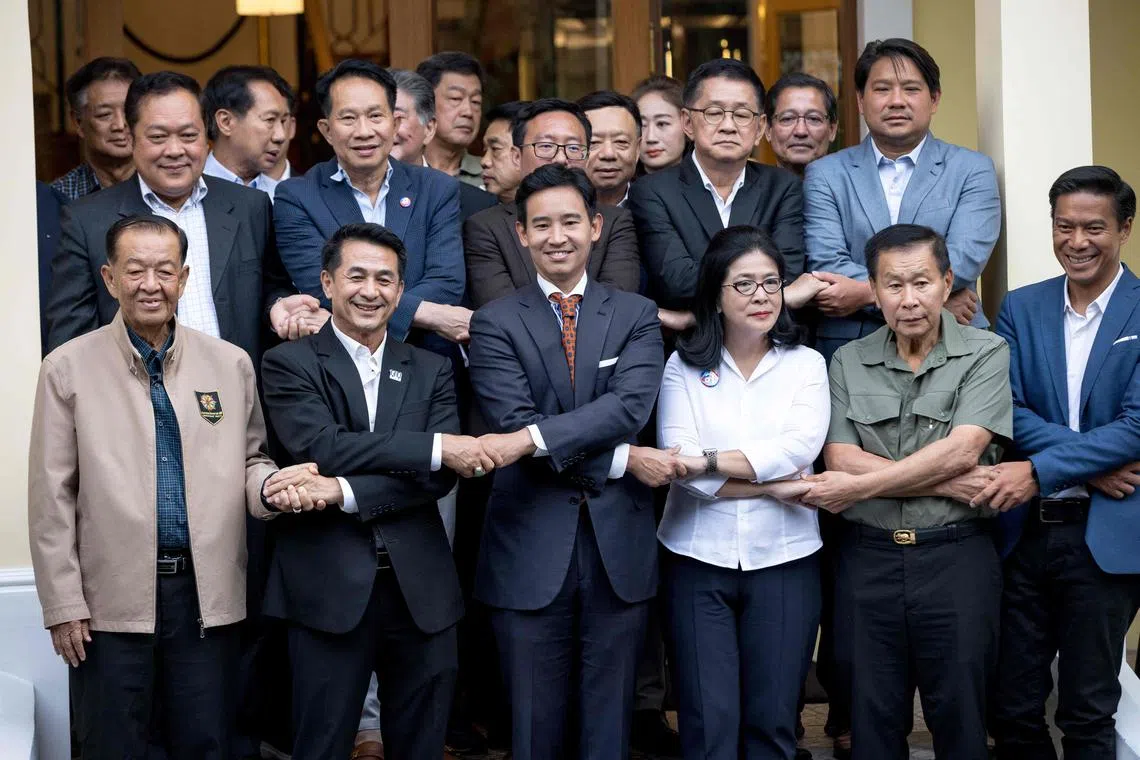Clock ticking for Move Forward-led coalition in Thailand to resolve differences
Sign up now: Get insights on Asia's fast-moving developments

Move Forward Party leader Pita Limjaroenrat (third from left) with potential coalition partners, including Pheu Thai Party leader Chonlanan Srikaew (second from left), in Bangkok in May.
PHOTO: AFP
BANGKOK - As the first session of Thailand’s newly elected Parliament on Monday draws near, the two major parties hoping to form the post-election government are locked in a stalemate over the top legislative post of House Speaker.
The tussle, which has turned into a public spat among members of the Move Forward and Pheu Thai parties, is the first test of the strength of the intended eight-party coalition.
If the parties – which came in first and second place in the May 14 general elections
They added that cracks have already appeared and there are rumours that an alternative coalition consisting of Pheu Thai and parties from the outgoing conservative regime could present itself.
“Both claim to be democratic parties, but they cannot work together,” said political analyst Pitch Pongsawat, noting that the biggest threat to the eight-party Move Forward Party-led alliance is its lack of strategy.
The alliance is formed by parties that share largely similar ideologies, such as opposing the Thai junta’s interference in elections, and a goal of rewriting the Constitution.
“They are democratic forces, but they lack direction. They (were aligned) on only one thing, which was to overthrow Prayut. But now that has happened, what is next?” said Dr Pitch.
He was referring to outgoing Thai Prime Minister Prayut Chan-o-cha, whose Ruam Thai Sang Chart party garnered only 36 seats in the polls.
The Move Forward Party (MFP), a youthful upstart that champions progressive and liberal policies, was the winner of the May election, with 151 seats.
It teamed up with Pheu Thai,
The bloc signed a memorandum of understanding (MOU) in May, and has committed to supporting MFP leader Pita Limjaroenrat in his bid to become prime minister.
But negotiations between the major coalition parties are deadlocked, with MFP and Pheu Thai both staking claim to the crucial House Speaker role.
A meeting was scheduled for Wednesday to try to break the impasse before a Lower House sitting next Tuesday, when lawmakers are expected to choose the House Speaker.
But the talks were cancelled after Pheu Thai leader Chonlanan Srikaew told local media on Tuesday that his party would not concede the House Speaker role to the MFP.
A flurry of activity, and contradicting reports suggesting that either party would give up the post, followed.
MFP and Pheu Thai said on Friday that negotiations were ongoing. The latest is that they will meet on Sunday to resolve this issue.
The coalition is cutting it close as Tuesday’s House Speaker vote looms, and Dr Khemthong Tonsakulrungruang, a political and legal don, said MFP and Pheu Thai might be using the pressure of time to sway negotiations in their favour.
“They could leave things until the very last minute and only finalise things just hours before,” he said, noting that this also happened in the lead up to the coalition’s MOU signing on May 22, where changes were still being made to the document half an hour before the ceremony.
The House Speakership is significant, as the individual will head the legislature and can chart the agenda of Parliament sittings.
The Speaker tables Bills for discussion, appoints House committee members, and has other legal powers and duties.
“The House Speaker is essentially a gatekeeper, and both parties want it because they do not trust that the other side will support their proposals,” said Dr Khemthong.
If the parties are unable to agree on who gets the post, the Tuesday nomination could result in a free vote.
This could divide the planned coalition and see rival parties propose their own candidates, said analysts.
But there is, perhaps, a larger objective.
Pheu Thai, a seasoned political party linked to former premier Thaksin Shinawatra, could be playing hard ball in an attempt to win more key roles, such as that of minister or deputy PM.
“The issue might not be the House Speakership, but rather that Pheu Thai wants to negotiate for more Cabinet seats,” said Dr Pitch.
There has been speculation that the initial proposal might have involved allocating 14 Cabinet seats and the PM position to the MFP, while Pheu Thai took 14 Cabinet seats and the House Speakership.
In recent days, there have been several local media reports about either side giving up seats in exchange for the House Speaker role. However, party leaders have denied this.
Taking this hypothesis a step further, political analyst Paul Chambers said the Speaker squabble could provide Pheu Thai with a convenient excuse to “dump the MFP”.
“(What) will result is that Pheu Thai will use this excuse to form a coalition with other parties,” said Dr Chambers.
He said the pro-regime parties that are part of the outgoing government have also been relatively quiet lately.
“This is a bad sign,” he said, adding that they could be quietly making mischief.
Pheu Thai, which failed in its goal of a landslide win in the May election, has had to repeatedly fend off speculation that it is forming an alternative coalition with outgoing government parties.
These rumours emerged largely due to members’ personal relationships with other politicians, and the party’s initial lack of clarity over its alliances.
However, Pheu Thai leader Chonlanan said this week: “Even if we wanted to leave (the MFP-led coalition), and we have the right to do so, we cannot, because it would be wrong.”
Next Tuesday’s vote for House Speaker will put the MFP-led coalition to the test, and despite the tensions, party leaders on Thursday continued to present a united front, sharing pictures and videos of themselves with wide smiles while at a working group meeting.
MFP secretary-general Chaithawat Tulathon said on Friday that there would be more clarity once the House Speaker is chosen.
“I believe this will end well because both parties are working in the best interest of the people,” he said.
Still, surviving this first hurdle is just the beginning of a likely long-drawn battle for the coalition, as several obstacles still threaten to stymie its formation of the government and Mr Pita’s bid to take power.
For one thing, the 312-member coalition will need support from non-allied MPs or the junta-appointed 250-member Senate to successfully vote Mr Pita in as PM.
But several MPs and senators have voiced opposition to the 42-year-old’s premiership, citing the MFP’s intention to amend the lese-majeste law
The vote for the premiership will take place after the House Speaker is chosen, possibly in the second week of July.
The MFP and its members continue to project confidence that they can cobble up enough support to lead the government, and Mr Pita has even dubbed himself the PM-designate of Thailand on his social media pages.
Observers say this could be a way to exert pressure on senators and other politicians to support the MFP, given that it won the largest share of votes.
But not everyone will take kindly to this, said Dr Pitch, adding: “The MFP seems to be trying to force the pro-regime establishments to comply with them rather than seeking to collaborate. They need to negotiate.”
Mr Pita also faces several legal challenges, one of which is an ongoing probe into whether he had violated election law
This allegation, which can result in jail time, a fine and a 20-year ban from politics, arose from an earlier complaint against Mr Pita’s possession of media shares.
Election candidates are not allowed to hold shares in media companies.
The MFP is also being investigated after critics accused it of attempting to overthrow the monarchy with its policy to amend the lese-majeste law.
Timeline of key events
July 3: First session of the newly elected Parliament.
July 4: House Speaker to be chosen.
Mid-late July: Parliament to vote for the prime minister; Cabinet appointments expected to be made.
August: New government to take over by then, as the caretaker government’s term will end.



